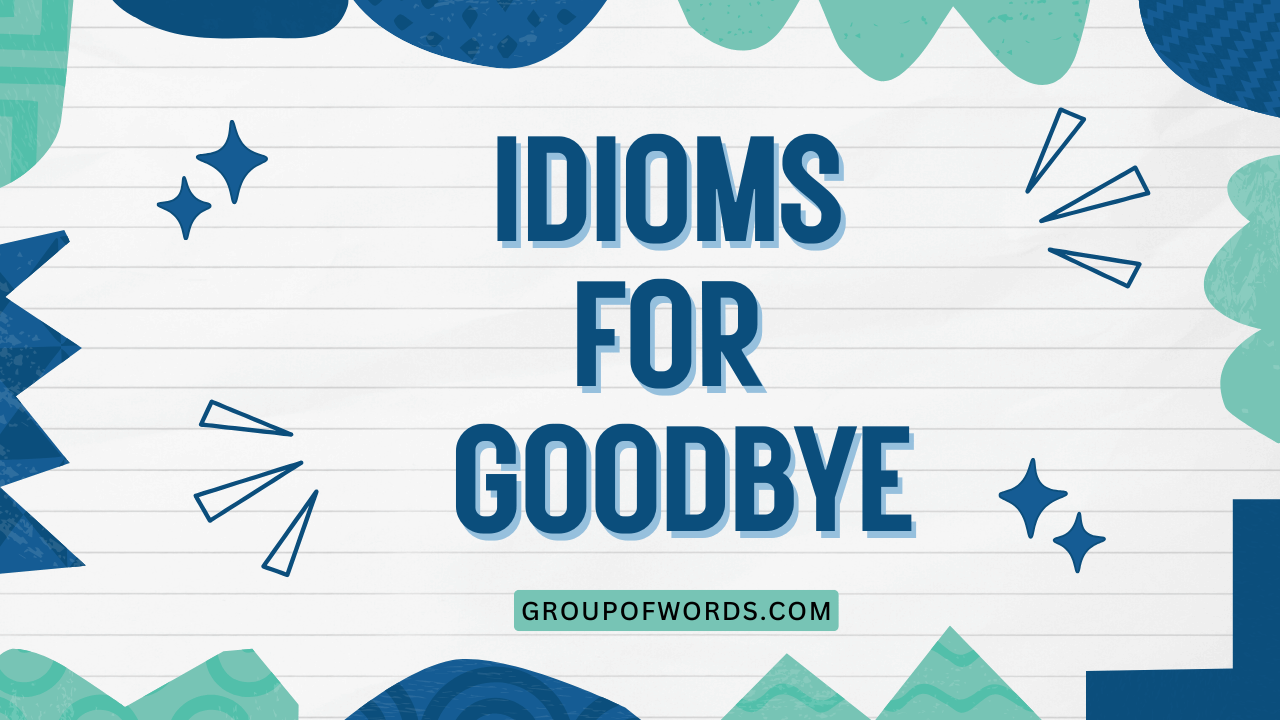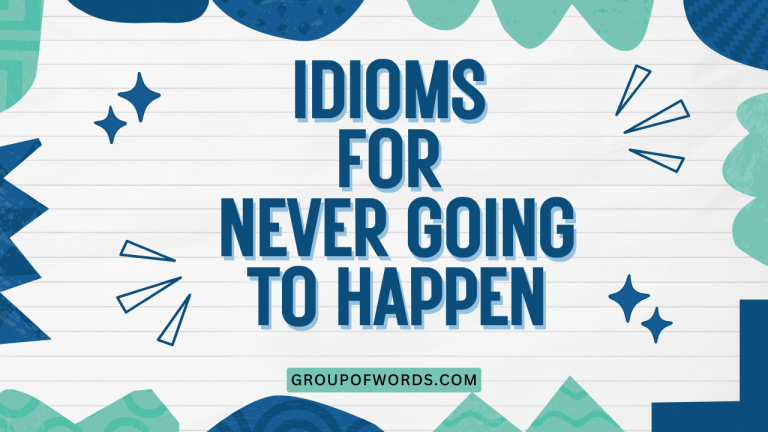Goodbye Idioms: Mastering Farewell Expressions in English
Saying goodbye is a universal part of human interaction, but in English, it’s rarely as simple as just saying “goodbye.” The language is rich with idioms that add color, nuance, and personality to farewells. Understanding these idioms is crucial for effective communication, allowing you to express your feelings more accurately and connect with native speakers on a deeper level.
This article delves into the world of goodbye idioms, exploring their meanings, origins, and usage. Whether you’re an English language learner or a native speaker looking to expand your vocabulary, this guide will equip you with the knowledge and confidence to say goodbye in style.
Table of Contents
- Introduction
- What are Idioms for Goodbye?
- Structural Breakdown of Goodbye Idioms
- Types and Categories of Goodbye Idioms
- Examples of Goodbye Idioms
- Usage Rules for Goodbye Idioms
- Common Mistakes with Goodbye Idioms
- Practice Exercises
- Advanced Topics in Goodbye Idioms
- Frequently Asked Questions
- Conclusion
Introduction
Mastering the art of saying goodbye in English goes beyond simply uttering the word “goodbye.” The English language offers a plethora of colorful idioms to express farewells, each carrying its own unique connotation and level of formality. Understanding these idioms is essential for effective communication and cultural fluency.
This article serves as a comprehensive guide to goodbye idioms, exploring their diverse forms, meanings, and appropriate contexts. Whether you’re aiming to enhance your conversational skills, improve your writing, or simply deepen your understanding of the English language, this resource will provide you with the tools to bid adieu with confidence and style.
What are Idioms for Goodbye?
Idioms for goodbye are fixed expressions or phrases whose overall meaning cannot be deduced from the literal definitions of their individual words. These expressions serve as alternatives to the standard “goodbye” and add color, personality, and cultural context to farewells.
They can range from formal and polite to casual and humorous, reflecting the relationship between the speakers and the situation. Understanding idioms for goodbye is vital for interpreting spoken and written English, as using them appropriately demonstrates a strong command of the language.
They are a subset of general idioms, specifically focusing on the act of parting ways.
Idioms, in general, are a type of figurative language where the meaning of the phrase is different from the literal meaning of the words. For example, the idiom “see you later, alligator” doesn’t literally mean the speaker will see an alligator later; it’s an informal way of saying goodbye.
The function of goodbye idioms is to soften the farewell, add a personal touch, or indicate the expected duration of separation. The context in which these idioms are used is crucial, as using a casual idiom in a formal setting could be inappropriate.
Structural Breakdown of Goodbye Idioms
Goodbye idioms, like all idioms, don’t follow a strict grammatical structure because their meaning is not derived from the individual words. However, we can analyze them based on their components and how they function within a sentence.
Many goodbye idioms are standalone phrases, such as “Farewell,” “So long,” or “Take care.” These phrases act as complete utterances, signaling the end of a conversation or interaction. Other idioms can be incorporated into a larger sentence, for example, “I must be off now,” where “be off” is the idiomatic part.
The structure often depends on the level of formality and the intended audience.
The key to understanding goodbye idioms lies in recognizing them as units of meaning rather than analyzing them word by word. For instance, “Keep in touch” is a common idiom that encourages continued communication.
Breaking it down literally doesn’t convey the intended meaning. The structure of such idioms is fixed; you can’t arbitrarily change the words without altering or losing the idiomatic sense.
Therefore, learning idioms involves memorizing them as distinct phrases and understanding their appropriate contexts.
Types and Categories of Goodbye Idioms
Goodbye idioms can be categorized based on several factors, including formality, duration of separation, and tone. Understanding these categories helps in choosing the appropriate idiom for different situations.
Formal Goodbye Idioms
Formal goodbye idioms are used in professional settings, when addressing superiors, or in situations where a respectful tone is required. These idioms often sound more sophisticated and polite.
- Farewell: A classic formal goodbye, often used when the separation is expected to be long or permanent.
- Adieu: Similar to “farewell,” but with a slightly more dramatic or final connotation.
- Goodbye: Although a standard term, it can be considered formal depending on the context and tone.
- I bid you adieu: A more elaborate and old-fashioned version of “adieu.”
- Have a good day/evening: A polite and formal way to wish someone well upon departure.
Informal Goodbye Idioms
Informal goodbye idioms are suitable for use with friends, family, and close acquaintances. They often convey a sense of warmth and familiarity.
- See you later: A common and casual way to say goodbye, implying a future meeting.
- So long: An informal and slightly old-fashioned goodbye.
- Bye: A shortened and very common version of “goodbye.”
- Catch you later: Similar to “see you later,” but more colloquial.
- Take care: A friendly way to wish someone well.
- Later: An even shorter version of “see you later”.
- Peace out: A very informal and slang term, meaning goodbye.
Idioms for Temporary Separation
These idioms are used when the separation is expected to be short-lived, suggesting a future reunion.
- See you soon: Implies a meeting in the near future.
- Until next time: Indicates that you expect to see the person again.
- I’ll be seeing you: A slightly more formal version of “see you soon.”
- Talk to you later: Suggests a future phone call or conversation.
- Keep in touch: Encourages continued communication.
Idioms for Permanent Separation
These idioms are used when the separation is expected to be long or permanent, often carrying a sense of finality.
- Farewell: As mentioned before, it can also be used for permanent separations.
- Adieu: Similar to “farewell” in its sense of finality.
- Goodbye forever: A very direct and somber expression.
- We shall not see each other again: A dramatic and formal expression.
Humorous Goodbye Idioms
Humorous goodbye idioms are used to lighten the mood and add a touch of levity to the farewell.
- See you later, alligator: A playful and rhyming goodbye.
- In a while, crocodile: Similar to “see you later, alligator.”
- Adios, amigos: A Spanish-influenced humorous goodbye.
- TTFN (Ta-ta for now): Popularized by Disney’s Tigger, it’s a playful way of saying goodbye.
- I gotta jet: Implying a need to leave quickly in a comical way.
Examples of Goodbye Idioms
This section provides extensive examples of goodbye idioms, organized by category, to illustrate their usage in various contexts. Each table includes numerous examples to help you understand the nuances of each idiom.
The following table showcases formal goodbye idioms. These are best used in professional environments or when addressing someone with respect and distance.
They convey politeness and a level of seriousness.
| Idiom | Example Sentence | Context |
|---|---|---|
| Farewell | Farewell, my friend, until we meet again. | Saying goodbye to a close friend who is moving away. |
| Adieu | Adieu, Monsieur Dubois, it has been a pleasure doing business with you. | Concluding a formal business meeting. |
| Have a good day | Thank you for your help; have a good day. | Ending a conversation with a customer service representative. |
| Have a good evening | It was lovely seeing you; have a good evening. | Saying goodbye after a formal dinner party. |
| I bid you adieu | I bid you adieu, and wish you the best in your future endeavors. | A formal farewell to a colleague who is retiring. |
| Goodbye | Goodbye, Professor Smith; thank you for the insightful lecture. | Ending a conversation with a professor after class. |
| Until we meet again | It’s been a pleasure. Until we meet again. | Concluding a formal event or conference. |
| I wish you well | Goodbye, and I wish you well in your new position. | Saying goodbye to a departing employee. |
| May your journey be safe | Goodbye, and may your journey be safe. | Farewelling someone embarking on a long trip. |
| It was a pleasure meeting you | It was a pleasure meeting you; I hope to see you again in the future. | Concluding a first-time meeting with a potential client. |
| I appreciate your time | Thank you for the meeting; I appreciate your time. | Ending a business meeting, showing respect for their time. |
| Good day to you | Good day to you, sir; I hope you find what you’re looking for. | A formal farewell in a retail setting. |
| I must take my leave | I must take my leave now; thank you for your hospitality. | Leaving a formal gathering, expressing gratitude. |
| Respectfully, goodbye | Respectfully, goodbye; I’ll await your response. | Ending a formal letter or email. |
| With best regards, goodbye | With best regards, goodbye; I look forward to our next collaboration. | Concluding a formal email to a business partner. |
| Have a prosperous day | Have a prosperous day; I hope your business thrives. | Wishing a business owner success upon leaving their establishment. |
| I wish you success | Goodbye, and I wish you success in all your future endeavors. | Farewelling someone starting a new project or business. |
| May fortune favor you | Goodbye, and may fortune favor you on your quest. | A formal and somewhat dramatic farewell, wishing someone good luck. |
| Until we are reunited | Goodbye for now, until we are reunited. | A formal farewell, anticipating a future reunion. |
| I remain, yours sincerely | I remain, yours sincerely, and bid you farewell. | A very formal way to end a letter or speech. |
| With utmost respect | With utmost respect, I bid you adieu. | A highly formal and respectful farewell. |
| Have a blessed day | Have a blessed day, and may your efforts be rewarded. | A formal and religiously influenced farewell. |
| Until our paths cross again | Goodbye, until our paths cross again in the future. | A formal way of saying goodbye, hoping for a future encounter. |
| I extend my best wishes | I extend my best wishes, and bid you a fond farewell. | A formal expression of goodwill upon departure. |
The following table presents informal goodbye idioms. These are perfect for casual conversations with friends, family, or colleagues you’re close to.
They add a personal touch to your farewell.
| Idiom | Example Sentence | Context |
|---|---|---|
| See you later | See you later, I’m off to the gym. | Saying goodbye to a friend before leaving for an activity. |
| So long | So long, it was great hanging out with you. | Ending a casual hangout with friends. |
| Bye | Bye, I’ll call you tomorrow. | Saying goodbye to a family member on the phone. |
| Catch you later | Catch you later, I’ve got to run. | Saying goodbye to a colleague when leaving work. |
| Take care | Take care, drive safely. | Saying goodbye to someone who is about to drive. |
| Later | Later, dude! | A very casual goodbye among young friends. |
| Peace out | Peace out, I’m heading home. | A slang goodbye, popular among younger generations. |
| I’m out | Alright, I’m out, see you guys next week. | Leaving a group gathering. |
| Gotta go | Gotta go, I have a meeting in five minutes. | Leaving quickly due to a time constraint. |
| See ya | See ya, have a good one! | A shortened and casual version of “see you.” |
| Have a good one | Alright, have a good one! | A friendly and casual way to wish someone well. |
| Talk to you soon | Okay, talk to you soon! | Ending a phone call with a friend or family member. |
| Keep in touch | It was great seeing you, keep in touch! | Encouraging someone to maintain communication. |
| Cheers | Cheers, see you around! | An informal goodbye borrowed from British English. |
| Alright, then | Alright, then, I’ll see you tomorrow. | A common informal goodbye in certain regions. |
| Laterz | Laterz! | A playful and very informal version of “later.” |
| Smell you later | Smell you later! | A joking goodbye among close friends. |
| Bye for now | Bye for now, I’ll catch up with you later. | A casual goodbye implying a future meeting. |
| I’m off | I’m off now, see you guys! | Leaving a group, indicating departure. |
| Have a good day | Have a good day! | A general, friendly goodbye. |
| Have a nice one | Have a nice one! | Similar to “have a good day,” but slightly more casual. |
| Take it easy | Take it easy! | Wishing someone well and encouraging them to relax. |
| All right | All right, bye! | A simple and casual way to say goodbye. |
| Stay cool | Stay cool! | A slang goodbye, wishing someone well and encouraging them to stay calm. |
| See you ’round | See you ’round! | A casual way of saying “see you around.” |
The table below lists humorous goodbye idioms. Use these when you want to lighten the mood or share a laugh with someone you know well.
These are not appropriate for formal or serious situations.
| Idiom | Example Sentence | Context |
|---|---|---|
| See you later, alligator | Alright, I’m leaving now, see you later, alligator! | A playful goodbye among friends. |
| In a while, crocodile | I’m heading out, in a while, crocodile! | A rhyming and humorous goodbye. |
| Adios, amigos | Adios, amigos, it’s time for me to go! | A Spanish-influenced humorous goodbye. |
| TTFN (Ta-ta for now) | Well, TTFN, I’ve got to run! | A playful goodbye popularized by Tigger from Winnie the Pooh. |
| I gotta jet | I gotta jet, catch you on the flip side! | Implying a quick departure in a comical way. |
| Later, tater | Later, tater! | A silly, rhyming goodbye. |
| Bye Felicia | I don’t need your negativity, bye Felicia! | A sassy and dismissive goodbye. |
| Smell you later! | Okay, I’m leaving. Smell you later! | A joking goodbye among close friends. |
| Toodaloo | Well, toodaloo! | A playful and old-fashioned goodbye. |
| Don’t have a cow! | I’m leaving now, don’t have a cow! | A humorous way to say goodbye and tell someone not to overreact. |
| I’m off like a dirty shirt | Well, I’m off like a dirty shirt! | A very informal and comical way to say goodbye. |
| Gotta scoot | Gotta scoot now! | Indicating a quick and somewhat comical departure. |
| I’m bailing | Alright, I’m bailing, see you later! | Informally indicating that you are leaving. |
| Keep the faith | Keep the faith, and I’ll see you around! | A somewhat humorous way to encourage someone while saying goodbye. |
| Don’t let the door hit you on the way out | If that’s your decision, then don’t let the door hit you on the way out! | A sarcastic and humorous way to tell someone goodbye. |
| I’m Audi 5000 | I’m Audi 5000! | A play on words, meaning ‘I’m out’. |
| Stay out of trouble | Stay out of trouble, and I’ll see you next week! | A lighthearted way to tell someone goodbye and to be careful. |
| Don’t be a stranger | It was great seeing you, don’t be a stranger! | Humorously encouraging someone to keep in touch. |
| Have fun storming the castle! | I’m leaving now, have fun storming the castle! | A playful reference to the movie “The Princess Bride”. |
| I’m going bye-bye | Okay, I’m going bye-bye! | A childlike and humorous way to say goodbye. |
| Keep your hair on | Alright, I’m leaving, keep your hair on! | A humorous way to tell someone to stay calm while saying goodbye. |
| Don’t do anything I wouldn’t do | I’m off, don’t do anything I wouldn’t do! | A humorous way of telling someone to be careful and sensible. |
| Toodle-pip! | Toodle-pip! It was lovely seeing you. | An old fashioned, British humorous goodbye. |
Usage Rules for Goodbye Idioms
Using goodbye idioms correctly requires understanding the context, formality, and the relationship with the person you are addressing. Here are some key rules to keep in mind:
- Formality: Always consider the level of formality required by the situation. Use formal idioms in professional settings and informal idioms with friends and family.
- Context: Pay attention to the context of the conversation. Some idioms are suitable only for temporary separations, while others are used for permanent farewells.
- Relationship: Choose idioms that reflect your relationship with the person you are addressing. Humorous idioms are best reserved for close friends and family.
- Cultural Sensitivity: Be aware of cultural differences in idiom usage. Some idioms may be more common or acceptable in certain regions or cultures.
- Tone: Match the tone of the idiom to the overall tone of the conversation. Avoid using humorous idioms in serious or somber situations.
It’s important to remember that idioms are not always directly translatable, and their meaning can be easily misunderstood if taken literally. Practice using these idioms in appropriate contexts to become more comfortable and confident in your usage.
Common Mistakes with Goodbye Idioms
Learners often make mistakes when using goodbye idioms. Here are some common errors and how to avoid them:
| Incorrect | Correct | Explanation |
|---|---|---|
| See you later, crocodile, in a while, alligator. | See you later, alligator; in a while, crocodile. | Mixing up the order of the rhyming phrases. |
| Farewell, dude! | Goodbye/Farewell. | Using an informal idiom in a formal situation. “Dude” is very informal. |
| I’m peace out forever! | Goodbye forever. | Using a casual idiom for a permanent separation. |
| Keep in touch always! | Keep in touch! | Adding unnecessary words to a fixed expression. |
| Catch you soonly! | Catch you soon! | Incorrectly modifying the idiom with an adverb. |
| I bid you adieu, mate! | I bid you adieu. | Using an informal term with a formal idiom. |
| See you never! | I don’t expect to see you again. | While technically correct, it can sound harsh. Avoid using “see you never” unless you really mean it. |
Avoiding these common mistakes will help you use goodbye idioms more effectively and appropriately. Always consider the context and your relationship with the person you are addressing to choose the most suitable idiom.
Practice Exercises
Test your understanding of goodbye idioms with these exercises. Choose the most appropriate idiom for each situation from the options provided.
Exercise 1: Choose the correct idiom for the following scenarios.
| Question | Options | Answer |
|---|---|---|
| You are leaving a formal business meeting. | a) See you later, b) Have a good day, c) Peace out | b) Have a good day |
| You are saying goodbye to a close friend. | a) Farewell, b) Bye, c) I bid you adieu | b) Bye |
| You are leaving a casual gathering with friends. | a) So long, b) Goodbye, c) Have a prosperous day | a) So long |
| You are saying goodbye to someone you expect to see again soon. | a) Until next time, b) Farewell, c) Adieu | a) Until next time |
| You are saying goodbye in a humorous way. | a) See you later, alligator, b) Have a good one, c) Take care | a) See you later, alligator |
| You are ending a phone call with a family member. | a) Talk to you later, b) I bid you adieu, c) Farewell | a) Talk to you later |
| You are leaving work for the day. | a) Catch you later, b) Goodbye forever, c) Adieu | a) Catch you later |
| You are saying goodbye to someone who is going on a long journey. | a) May your journey be safe, b) See you soon, c) Later | a) May your journey be safe |
| You are ending a conversation with a colleague. | a) Take care, b) I’m out, c) Peace out | a) Take care |
| You are saying goodbye in a very casual way. | a) Later, b) Farewell, c) Have a good evening | a) Later |
Exercise 2: Fill in the blanks with the most appropriate idiom.
| Question | Answer |
|---|---|
| ________, I’m off to the store. | See you later |
| It was a pleasure meeting you; ________. | Have a good day |
| ________, drive safely! | Take care |
| ________, it’s been great hanging out. | So long |
| ________, I have a meeting to attend. | Gotta go |
| ________, I’ll call you tomorrow. | Bye |
| ________, I’m heading home. | Peace out |
| ________, until we meet again. | Farewell |
| ________, I’ve got to run. | Catch you later |
| ________, I’m out! | Alright |
Advanced Topics in Goodbye Idioms
For advanced learners, exploring the historical context and regional variations of goodbye idioms can provide a deeper understanding of their usage. Some idioms have roots in specific historical periods or literary works.
For example, “adieu” has French origins and was commonly used in formal settings in the past. Understanding these origins can add nuance to your usage.
Regional variations also play a significant role. British English has its own set of goodbye idioms, such as “cheers” or “toodle-pip,” which may not be as common in American English.
Similarly, certain slang terms may be specific to certain regions or communities. Being aware of these variations can help you avoid miscommunication and use idioms more effectively in different contexts.
Furthermore, the evolution of goodbye idioms is an interesting area of study. New idioms emerge over time, reflecting changes in culture and language.
For example, the rise of internet slang has led to the creation of new goodbye idioms used in online communication. Keeping up with these trends can help you stay current and relevant in your use of English.
Frequently Asked Questions
Here are some frequently asked questions about goodbye idioms:
- What is the difference between an idiom and a saying?
An idiom is a phrase whose meaning is not predictable from the usual meanings of its constituent elements (e.g., “kick the bucket” meaning “to die”). A saying, on the other hand, is a general truth or piece of advice expressed in a concise and memorable way (e.g., “actions speak louder than words”).
- How can I learn more goodbye idioms?
Read widely in English, listen to English conversations, and pay attention to how native speakers use goodbye idioms. Keep a notebook of new idioms you encounter and practice using them in your own conversations. Using online resources and language learning apps can also be helpful.
- Is it okay to use slang goodbye idioms in formal settings?
No, it is generally not appropriate to use slang goodbye idioms in formal settings. Stick to formal idioms such as “goodbye,” “farewell,” or “have a good day” when addressing superiors or in professional environments.
- What is the origin of the idiom “see you later, alligator”?
The origin of “see you later, alligator” is uncertain, but it is thought to have emerged in the mid-20th century as a playful rhyming phrase. It is often followed by the response “in a while, crocodile.”
- How do I know which goodbye idiom is appropriate for a specific situation?
Consider the level of formality, the context of the conversation, and your relationship with the person you are addressing. If in doubt, err on the side of formality. Observing how native speakers use goodbye idioms in various situations can also be helpful.
- Are there any goodbye idioms that are considered rude?
While most goodbye idioms are generally polite, some can be perceived as rude depending on the context and tone. For example, saying “good riddance” implies that you are glad to see someone leave, which is clearly impolite. Similarly, “bye Felicia” can be seen as dismissive and disrespectful.
- Can I create my own goodbye idioms?
While you can certainly be creative with your language, inventing entirely new idioms is unlikely to be successful unless they catch on with a wider community. It’s best to focus on learning and using existing idioms correctly.
- Why is it important to learn goodbye idioms?
Learning goodbye idioms enhances your communication skills, allows you to express yourself more colorfully and accurately, and helps you connect with native speakers on a deeper level. It also demonstrates a strong command of the English language and cultural fluency.
Conclusion
Mastering goodbye idioms is a valuable skill for anyone learning or using the English language. These expressions add richness and nuance to your communication, allowing you to convey farewells with personality and cultural awareness.
By understanding the different types of goodbye idioms, their usage rules, and common mistakes to avoid, you can confidently navigate various social and professional situations. Remember to consider the context, formality, and your relationship with the person you are addressing when choosing the appropriate idiom.
Continue practicing and expanding your knowledge of goodbye idioms through reading, listening, and engaging in conversations with native speakers. As you become more familiar with these expressions, you’ll find yourself using them naturally and effectively.
Embrace the opportunity to add color and personality to your farewells, and you’ll be well on your way to mastering the art of goodbye in English. Remember, language learning is a journey, and every idiom you learn brings you one step closer to fluency.






